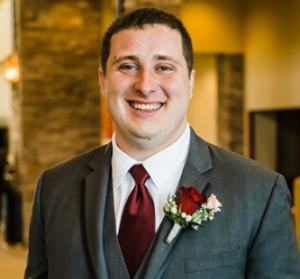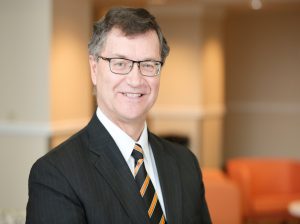Stephen E. Alway, Ph.D.,FACSM
Principal Investigator.
Dr. Alway studies aging-induced changes in structure and function and remodeling in skeletal muscle, and satellite cells (adult muscle stem cells) under loading and wasting conditions. He has used exercise, denervation and muscle disuse in several animal models including rodents and birds and elderly human subjects in these studies. Recent investigations have focused on the genetic regulation of antioxidants and Sirtuin-1 activators as a potential counter measure to reduce muscle wasting using aging animal models and humans. We currently have three primary projects.
- Mitochondria. Understanding the role of mitochondria health and abundance in regulating muscle mass in aging and disease. The figure below shows examples of health (red arrows) and unhealthy (blue arrow) mitochondria from a muscle biopsy of an elderly human subject.
- Molecular signaling. In a second area of concentration we are striving to understand the role of genetics, exercise and diet on maintaining muscle health and function. These studies involve working with transgenic mice that we have developed and also obtained muscle function studies in elderly, and obese human subjects.
- Muscle repair. Adult muscle stem cells also called satellite cells are essential for muscle repair, but aging, obesity, diabetes and other conditions reduces the ability of satellite cells to repair injured muscle properly. These studies are designed to investigate the role of oxidative stress, aging and nutrition to impact muscle recovery. We are particularly interested in nutritional interventions such as resveratrol (an activator of Sirtuin 1), green tea (which is rich in catechins) and other regulators of satellite cell activated muscle repair.
Dr. Alway’s publications can also be found in PubMed at:
- salway@uthsc.edu
- Pubmed
- Google Scholar
- Research Gate

Hector G. Paez, M.S.
Graduate Research Assistant
Hector Paez is a student researcher and current Biomedical Sciences PhD student in the Department of Physiology. Hector obtained a B.S in Exercise Science and Health Promotions and an M.S. in Exercise Science with a concentration on exercise physiology at Florida Atlantic University. Hector’s Master’s thesis involved the regulation of myokine Cathepsin B release from skeletal muscle during exercise, and its potential therapeutic role in a murine model of Alzheimer’s disease. Hector has also been involved in research revolving around changes in mitochondrial function and signaling in tumor bearing mice at various stages of cancer cachexia. Currently, Hector’s research is focused on the role mitochondria play in skeletal muscle atrophy and how therapeutic manipulation of mitochondria can mitigate muscle dysfunction and atrophy in murine models of aging, stroke, and obesity. As a second-year graduate student, Hector was awarded the J. Paul Quigley Memorial Scholarship after completing all Integrated Biomedical Sciences core coursework with a 4.0 GPA.
- Hpaez1@uthsc.edu
- Pubmed
- Google Scholar
- Research Gate

Christopher R. Pitzer, M.S.
Graduate Research Assistant
Chris is currently a third year biomedical sciences PhD. Student. Prior to moving to UTHSC Chris attended West Virginia University where he completed a B.S. and an M.S. degree in exercise physiology. Chris’ previous thesis work focused on the effects of electronic cigarette vapor on blood flow in resistance arterioles. Currently, his work focuses on muscle dysfunction associated with type 2 diabetes. Chris has also been involved with projects involving muscle recovery from injury, exosomal cargo changes in response to oxidative stress, and nuclear flux of proteins that influence transcription. Chris is an active member of UTHSC student government and is currently serving as the secretary of the graduate student executive council (GSEC).
cpitzer1@uthsc.edu

